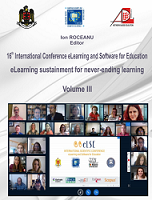THE DATA STRUCTURES FOR E-LEARNING (DSEL) PLATFORM
THE DATA STRUCTURES FOR E-LEARNING (DSEL) PLATFORM
Author(s): Ciprian-Bogdan Chirilă, Oana-Sorina ChirilaSubject(s): Media studies, ICT Information and Communications Technologies, Distance learning / e-learning
Published by: Carol I National Defence University Publishing House
Keywords: auto-generative learning objects; HTML; dynamic content; PHP; MySQL;
Summary/Abstract: Auto-Generative Learning Objects (AGLO) are reusable learning templates that can be instantiated with content based on random numbers. The templates are filled with content generated automatically by metaprogramming. The DSEL platform is a web application that processes the AGLO templates and generates interactive HTML content for the students. The platform includes user authentication based on Google, Facebook and Yahoo in order to avoid creating new credentials. Each HTTP session is stored in the database in order to analyse the progress of the learning process for each student. The DSEL platform processes the evaluation of symbols and then replaces the content of HTML. The symbols may have text values or SVG (Scalar Vector Graphics) content. The platform is responsible for processing the interaction between student and the correct answer. It evaluates the student answer by comparing it to the computed answer. Another aspect of the interaction is about selecting the right feedback to be shown to the student based on the given answer. The DSEL platform manages the persistence of the student’s interactions. Since the HTML content is dynamically generated each symbol is posted in a MySql database through a PHP persistence module. The navigation on the AGLO objects hierarchy tree is monitored and stored in the database. Each visit to an AGLO and its generated content is stored in the database to be further investigated. The result of the student answer evaluation is stored in the database too. The learning progress is showed in a web page for each user and globally for the administrator. The platform is prepared to be evaluated for two disciplines namely, Data Structures and Algorithms and Algorithm Design and Analysis. As perspective, we intent to implement an analytics module to gather conclusions from the AGLO learning approach.
Journal: Conference proceedings of »eLearning and Software for Education« (eLSE)
- Issue Year: 16/2020
- Issue No: 03
- Page Range: 51-56
- Page Count: 6
- Language: English

